BNA members receive international recognition with SfN awards
8th October 2024
BNA Event - 10th Dec 2024
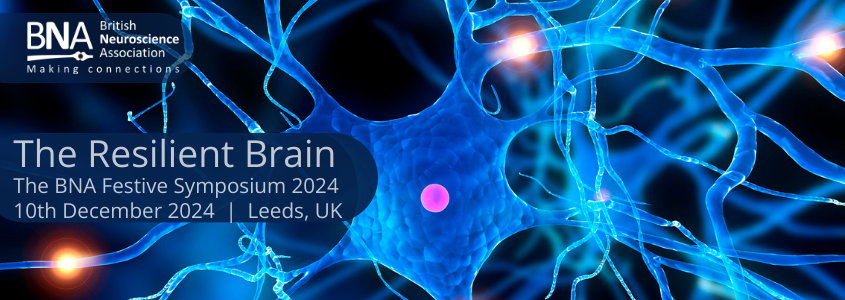
Our Festive Symposia launch the BNA’s forthcoming annual themes: for 2025, the theme will be the ‘Resilient Brain’.
The BNA Festive Symposium is one of the most popular events in the neuroscience calendar, with a reputation for lively and inclusive programmes bringing neuroscientists together to network, have fun and explore a central theme through a series of short talks that are accessible for everyone, regardless of experience and expertise.
Throughout this lively and inclusive (and festive!) meeting, we will examine the theme from multiple viewpoints. The 2024 Festive Symposium will bring together neuroscientists in academia, the clinic and the commercial sector to share their latest research and explore the topic from multiple viewpoints including traumatic brain injury, resilience to ageing and disease, and mental health and protective lifestyle factors.
 Tom Manly, University of Cambridge: Neurorehabilitation following TBI and stroke
Tom Manly, University of Cambridge: Neurorehabilitation following TBI and stroke
Dr Manly is a clinical psychologist, clinical neuropsychologist and Programme Leader at the University of Cambridge MRC Cognition and Brain Sciences Unit. Tom was awarded the Elizabeth Warrington Prize by the British Neuropsychological Society for contributions to the neuropsychological literature and the British Psychological Society’s (BPS) Spearman Medal. He has served on the BPS Division of Neuropsychology Committee, The Stroke Association Research Committee and was president of the British Academy of Science Psychology Section.
 Susannah Walker, University of Liverpool: Resilience to stress
Susannah Walker, University of Liverpool: Resilience to stress
Dr Walker's research is focused on how exposure to biologically salient sensory stimuli influences emotional and cognitive behaviour. She is a member of the Somatosensory & Affective Neuroscience group at LJMU and Co-I on a Leverhulme Trust Funded project investigating the role of 5-HT in psychological responses to affective touch.
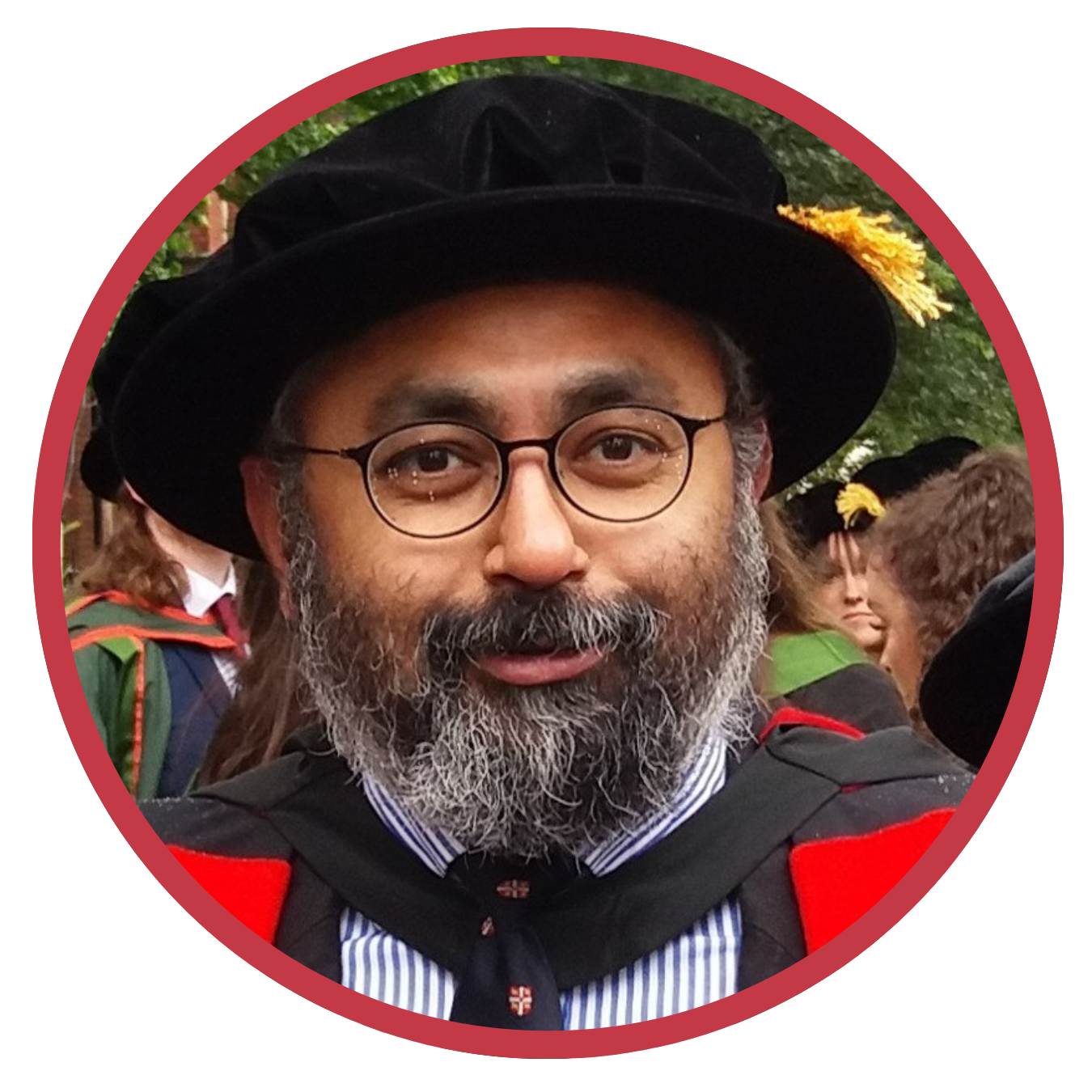 Samit Chakrabarty, University of Leeds: Rehabilitation after traumatic brain injury
Samit Chakrabarty, University of Leeds: Rehabilitation after traumatic brain injury
Dr Chakrabarty is a systems neurophysiologist, studying plasticity and interaction between the spinal circuits and their modulators - the sensory inputs from periphery and descending inputs from brain.
 Liat Levita, University of Sussex: Resilient mental health in adolescents
Liat Levita, University of Sussex: Resilient mental health in adolescents
Dr Levita runs the Developmental Affective Neuroscience lab, and use a translational approach to study the human adolescent period. Her research is focused on understanding mental health pathologies, which in many emerge during the adolescent period and are strongly associated with experiences of trauma.
 Dan Ridley, Lilly: The Brain Health Coalition
Dan Ridley, Lilly: The Brain Health Coalition
Dan is the Alzheimer’s Disease Lead, Northern European Hub.
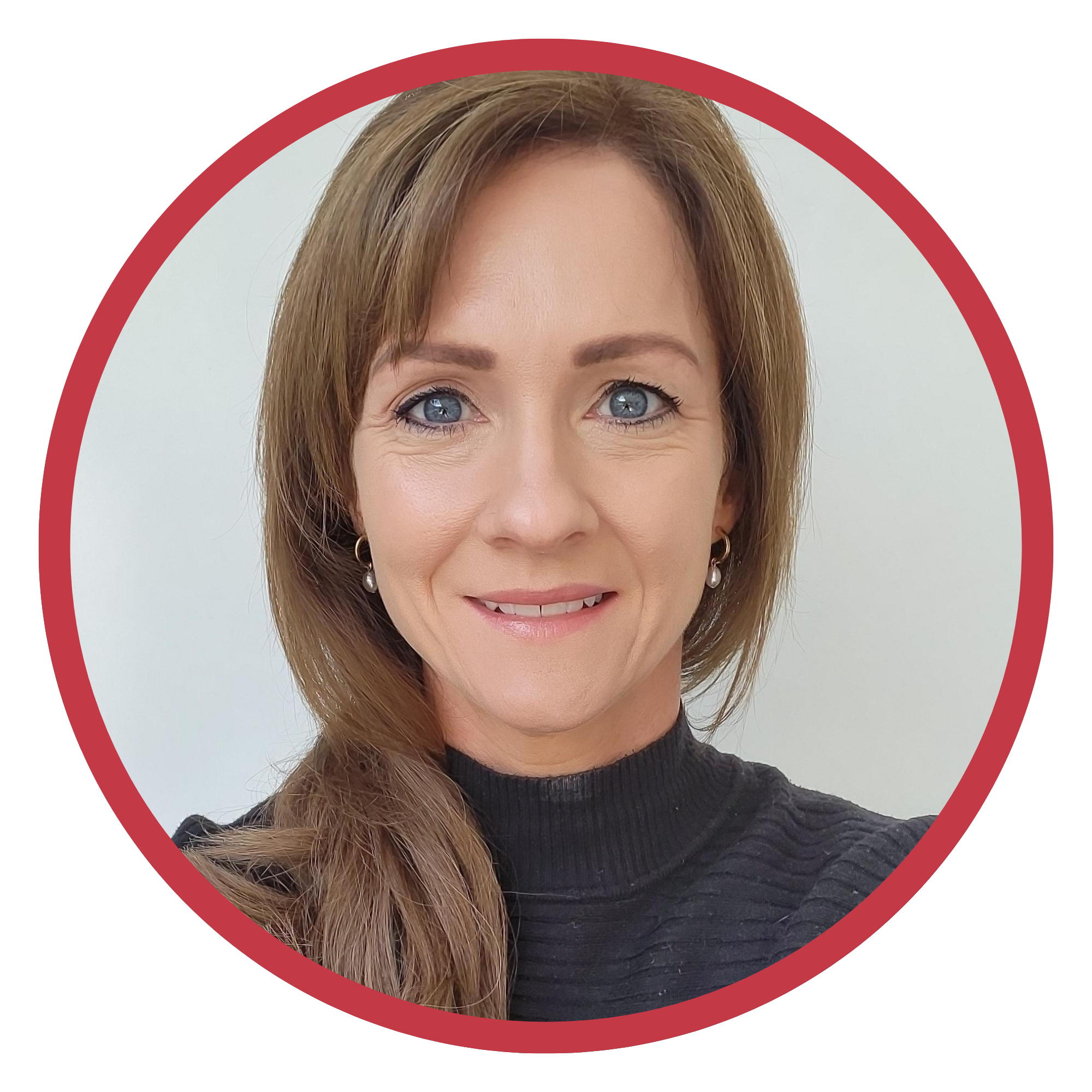 Michelle Kelly, National College of Ireland: Preventative lifestyle factors
Michelle Kelly, National College of Ireland: Preventative lifestyle factors
Dr Kelly is a PI on research projects funded by the Irish Research Council (IRC) and the Alzheimer’s Society of Ireland, and contributes to research and clinical placement supervision in Trinity College Dublin, Galway University, Maynooth University, and the International CST Centre in University College London.
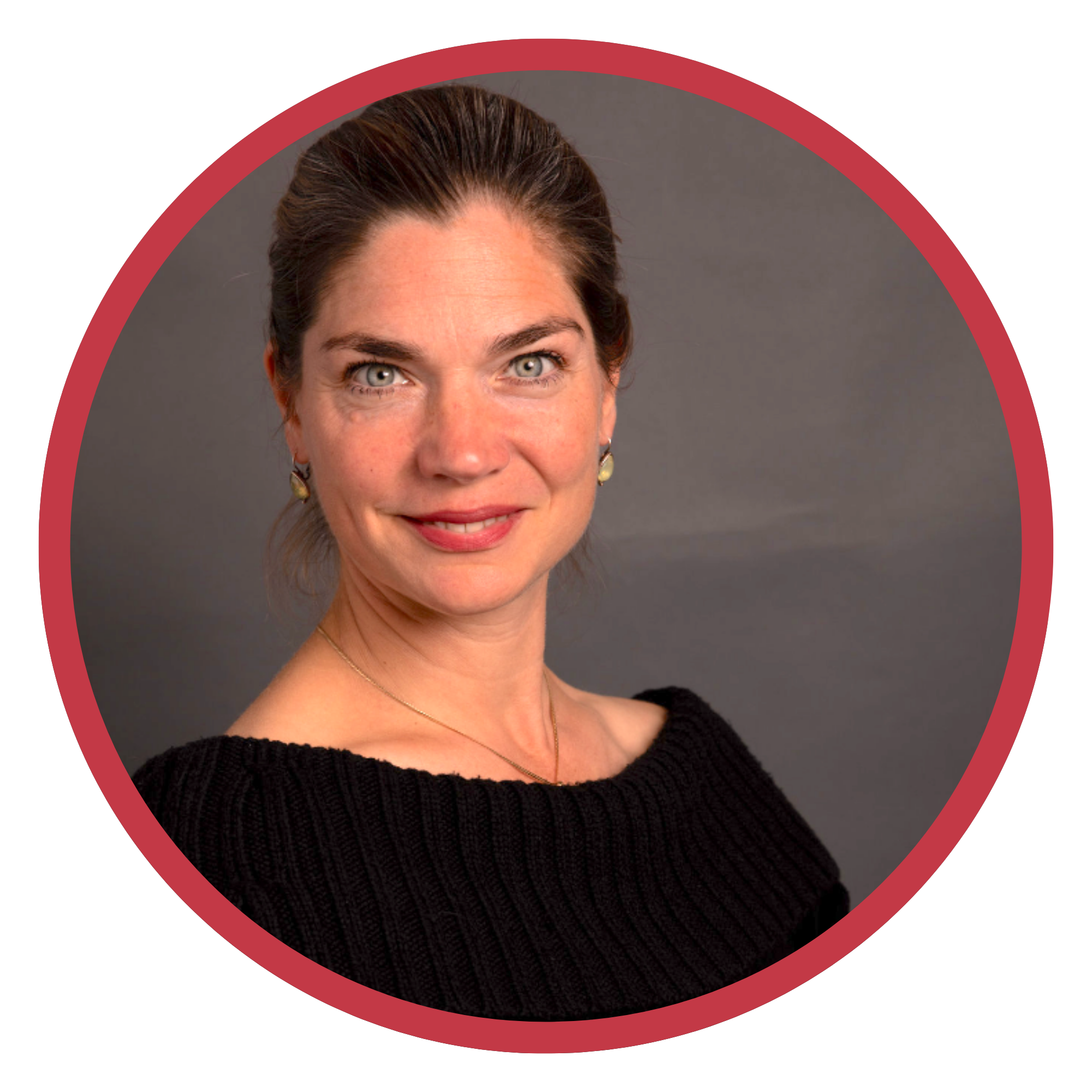 Henne Holstege, Alzheimer Centre Amsterdam, Amsterdam UMC: Resilience in the ageing brain
Henne Holstege, Alzheimer Centre Amsterdam, Amsterdam UMC: Resilience in the ageing brain
PLENARY SESSION
Dr Holstege is an assistant professor at the department of Human Genetics of the Amsterdam University Medical Center, and she is a staff-member of the Amsterdam Alzheimer Center. She runs an independent research section at the department of Human Genetics: Genomics of Neurodegenerative Diseases and Aging. She and the bioinformaticians in her lab are affiliated with the Delft Bioinformatics Lab, (Department of Intelligent Systems, Technical University Delft) to be up to date with state-of-the-art bioinformatics techniques. The main focus of her lab lies on the identification of genomic factors underlying the increased risk and the escape of neurodegenerative diseases with a focus on Alzheimer’s Disease.
10:00 - 10:30 Registration
10:30 - 10:40 Introduction from the BNA Chief Executive, Laura Ajram and President, Tara Spires-Jones
10:40 - 11:15 Tom Manly, University of Cambridge: Neurorehabilitation following TBI and stroke
11:15 - 11:50 Susannah Walker, University of Liverpool: Resilience to stress
11:50 - 12:10 BREAK
12:10 - 12:45 Samit Chakrabarty, University of Leeds: Rehabilitation after traumatic brain injury
12:45 - 13:20 Liat Levita, University of Sussex: Resilient mental health in adolescents
13:20 - 14:20 LUNCH
14:20 - 14:30 Prizes
14:30 – 15:05 Dan Ridley, Lilly: The Brain Health Coalition
15:05 - 15:40 Michelle Kelly, National College of Ireland: Preventative lifestyle factors
15:40 - 15:50 BREAK
15:50 - 16:10 Laura Ajram, Chief Executive of the British Neuroscience Association: Review of the year, and looking forward.
16:10 - 17:00 Henne Holstege plenary session, Alzheimer Centre Amsterdam, Amsterdam UMC: Resilience in the ageing brain
17:00 - 17.10 Closing words
17:10 - 18:40 DRINKS RECEPTION FOR ALL DELEGATES + POSTER SESSION

The Met Hotel Leeds has welcomed guests for over a century. Designed by local architects, the hotel is renowned for its Victorian terracotta facade and stone cupola taken from the city's demolished 4th White Cloth Hall. Today, The Met Hotel Leeds is still a much-loved landmark in Leeds' cityscape, blending the original design with contemporary interiors to create a Leeds 4-star city centre hotel. Conveniently located just minutes from Leeds train station and in the centre of the city.
Visit The Met Hotel's website here.
The Met Hotel is conveniently located just a short 3-minute walk from Leeds train station, placing you in the vibrant heart of the city.
Guests can easily access Leeds from various locations across the UK:
| Location | To Leeds by Tain |
| Birmingham | ~ 2 hours |
| Bradford | 20-30 mins |
| Chester | ~2 hours |
| Derby | ~1.5 hours |
| Durham | ~2 hours |
| Harrogate | 30-40 mins |
| Hull | 1-1.5 hours |
| Liverpool | 1.5-2 hours |
| London | 2-2.5 hours |
| Manchester | ~1 hour |
| Newcastle | 1.5-2 hours |
| Nottingham | 1.5-2 hours |
| Preston | ~1.5 hours |
| Scarborough | ~2 hours |
| Sheffield | 40-50 mins |
| Wakefield | 15-20 mins |
| York | 25-30 mins |
We look forward to welcoming you to The Met Hotel!
 Make the most of your time in Leeds, considered by many to be the cultural and shopping capital of the North.
Make the most of your time in Leeds, considered by many to be the cultural and shopping capital of the North.
The Christmas market is running from Friday 22nd November – Sunday 22nd December 2024. Explore a variety of festive stalls selling unique gifts, crafts, and delicious treats from around the world. Enjoy pop-up performances and tuck into a standout selection of food and drink options that embody the spirit we all know and love around this time of year. The market will also run alongside the popular Ice Cube at Christmas ice skating rink on Millennium Square and Victoria Gardens. More information here.
 Thanks to the support of The Company of Biologists, we are pleased to offer financial support to make it easier for delegates to avoid travelling by plane, and instead opt for greener modes of travel. Awards of up to £100 will be made to successful applicants to support the difference in cost between plane and other travel options. Application deadline: 13th November 2024
Thanks to the support of The Company of Biologists, we are pleased to offer financial support to make it easier for delegates to avoid travelling by plane, and instead opt for greener modes of travel. Awards of up to £100 will be made to successful applicants to support the difference in cost between plane and other travel options. Application deadline: 13th November 2024
Find out more and apply here.
The Company of Biologists is a not-for-profit publishing organisation dedicated to supporting and inspiring the biological community. Find out more at www.biologists.com.
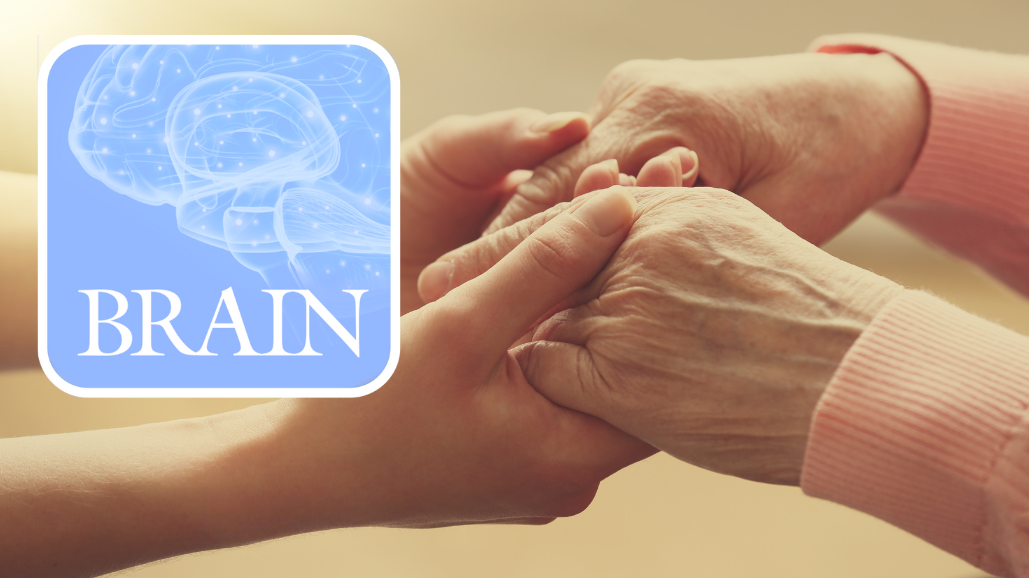 Thanks to the support of The Guarantors of Brain, the BNA is awarding 4 Carer Grants of up to £250 to help cover expenses associated with caring responsibilities and thereby enable participation in the Festive Symposium. Applications must be submitted four weeks in advance of the event .
Thanks to the support of The Guarantors of Brain, the BNA is awarding 4 Carer Grants of up to £250 to help cover expenses associated with caring responsibilities and thereby enable participation in the Festive Symposium. Applications must be submitted four weeks in advance of the event .
We are delighted to announce the call for delegates to share their research during a poster session.
We are anticipating 250 delegates from the neuroscience community to attend the Festive Symposium, and encourage submissions for poster abstracts to share your research at one of the most popular events in the neuroscience calendar.
Submission deadline = 8th November 2024 23:59pm (GMT).
Applicants will be notified on 20th November 2024.
Please read the full terms here before submitting your poster abstract.
Please note that there is a limited number of posters available.
The British Neuroscience Association (BNA) is highly aware of the environmental impact of holding meetings, and have therefore taken the following measures to increase the sustainability of this event. If you have further ideas or comments, please do contact the BNA at office@bna.org.uk.
Meeting fees include two refreshment breaks, lunch and a wine reception.
PLEASE BE AWARE that meat will not be provided at lunchtime unless specially requested by indicating in the ‘requirements’ section during registration. The default option will be vegetarian. This is in an effort to reduce the carbon footprint associated with food waste at conferences and events.
All other special dietary requests (vegan, gluten-free, halal etc) can also be catered for by requesting in the ‘requirements’ section during registration.
We invite your organisation to be part of this special event with sponsorship opportunities from £300. 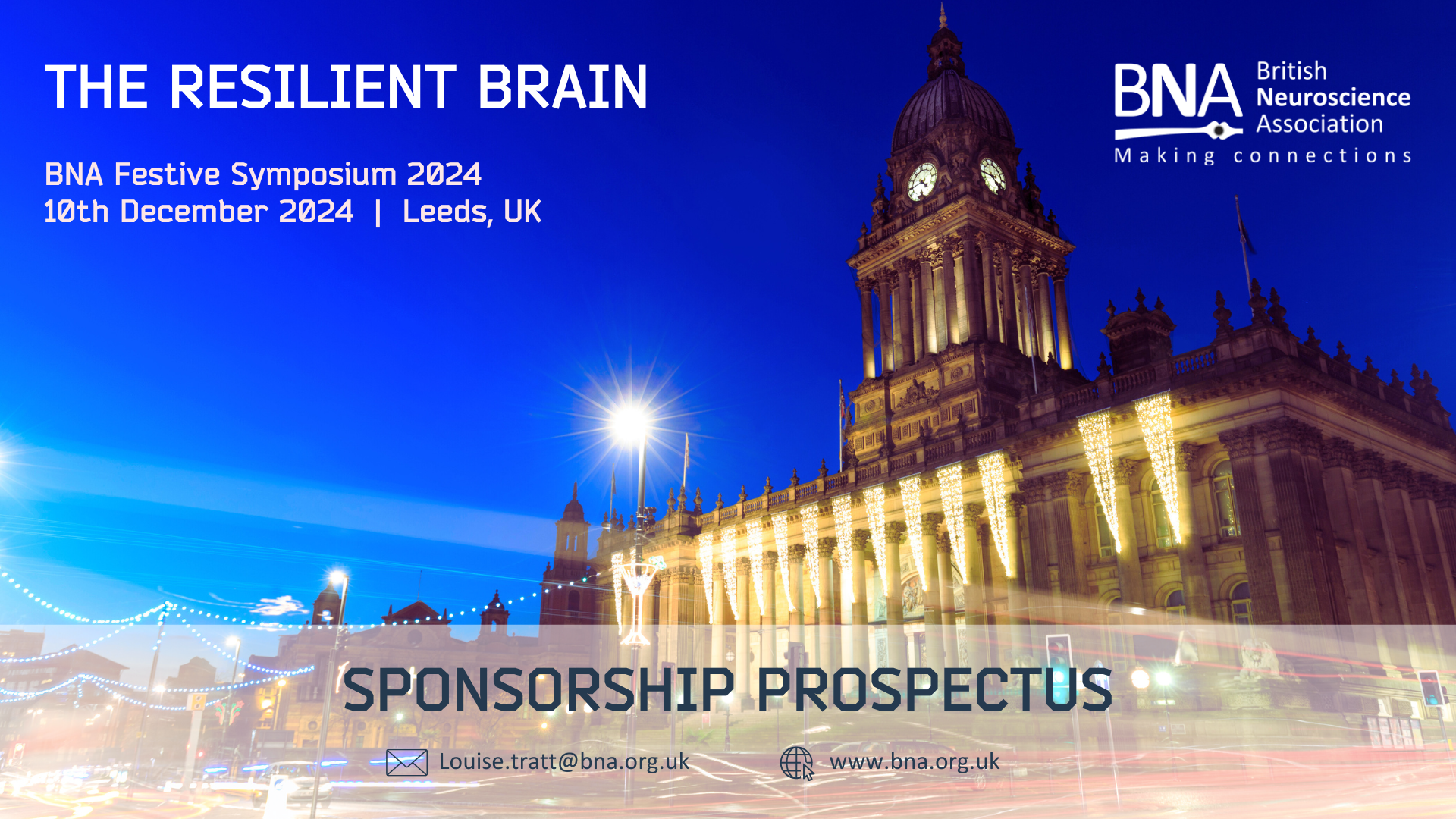
Please download the sponsorship prospectus and complete the booking form to secure your place.
Please contact Louise Tratt (louise.tratt@bna.org.uk) for further information.
To be announced!
Presentations for the above prizes will take place during the Festive symposium.
All participants at BNA events (including events hosted by other organisations exclusively for BNA members) are required to read and follow the BNA's Safer Spaces Policy (click to read in full).
| Member | Non-member | |
| Undergraduate/ 'A' level student | FREE* | £18.50 |
| Postgraduate/ Career starter | £25.00 | £50.00 |
| Early Career Scientist/ Clinician | £38.50 | £75.00 |
| Associate member/ public | £38.50 | £110.00 |
| Full/ Full industry | £75.00 | £110.00 |
| Retired | £38.50 | £70.00 |
| Honorary | £38.50 |
*BNA undergraduate members - Please note that the BNA undergrad registration fee (£18.50) is refundable based on successful attendance at the event.
All prices inclusive of UK VAT at 20%.